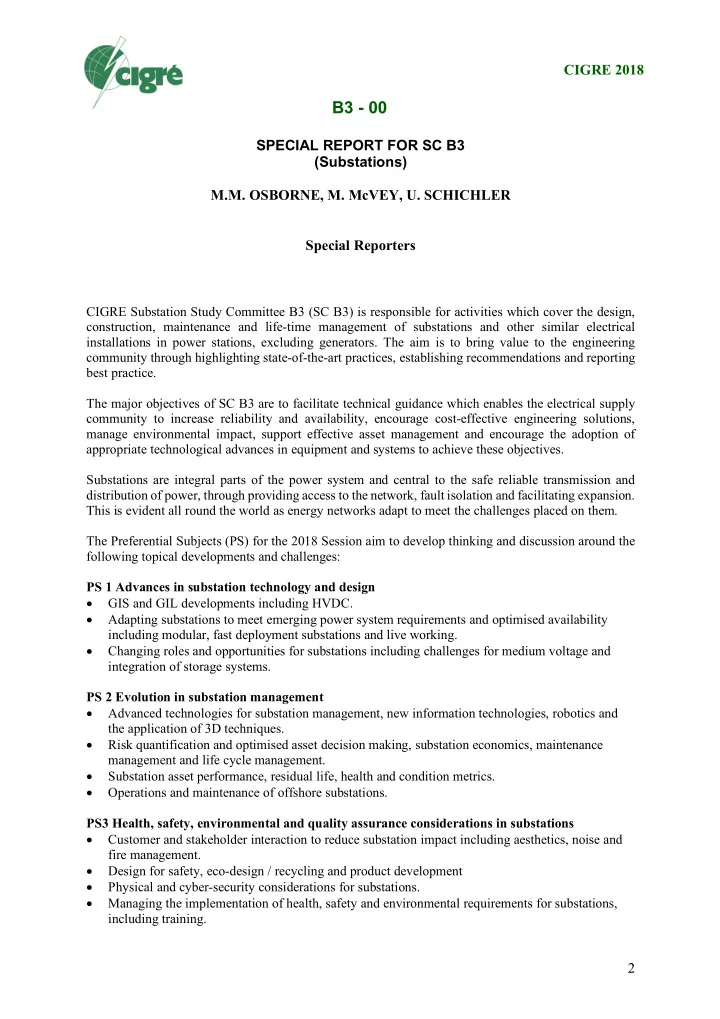

CIGRE 2018 B3 - 00 SPECIAL REPORT FOR SC B3 (Substations) M.M. OSBORNE, M. McVEY, U. SCHICHLER Special Reporters CIGRE Substation Study Committee B3 (SC B3) is responsible for activities which cover the design, construction, maintenance and life-time management of substations and other similar electrical installations in power stations, excluding generators. The aim is to bring value to the engineering community through highlighting state-of-the-art practices, establishing recommendations and reporting best practice. The major objectives of SC B3 are to facilitate technical guidance which enables the electrical supply community to increase reliability and availability, encourage cost-effective engineering solutions, manage environmental impact, support effective asset management and encourage the adoption of appropriate technological advances in equipment and systems to achieve these objectives. Substations are integral parts of the power system and central to the safe reliable transmission and distribution of power, through providing access to the network, fault isolation and facilitating expansion. This is evident all round the world as energy networks adapt to meet the challenges placed on them. The Preferential Subjects (PS) for the 2018 Session aim to develop thinking and discussion around the following topical developments and challenges: PS 1 Advances in substation technology and design • GIS and GIL developments including HVDC. • Adapting substations to meet emerging power system requirements and optimised availability including modular, fast deployment substations and live working. • Changing roles and opportunities for substations including challenges for medium voltage and integration of storage systems. PS 2 Evolution in substation management • Advanced technologies for substation management, new information technologies, robotics and the application of 3D techniques. • Risk quantification and optimised asset decision making, substation economics, maintenance management and life cycle management. • Substation asset performance, residual life, health and condition metrics. • Operations and maintenance of offshore substations. PS3 Health, safety, environmental and quality assurance considerations in substations • Customer and stakeholder interaction to reduce substation impact including aesthetics, noise and fire management. • Design for safety, eco-design / recycling and product development • Physical and cyber-security considerations for substations. • Managing the implementation of health, safety and environmental requirements for substations, including training. 2
Executive Summary This year a total of 42 papers from 23 countries addressing the 3 preferential subjects have been accepted for the 2018 CIGRE Session. As always, this material provides a valuable contribution to the active work of Study Committee B3 and a snap shot of the key issues on utilities minds during this period. The effort and time afforded by the authors and their supporting organisations in producing these papers is greatly appreciated. CIGRE aims to encourage discussion and involvement in the Paris session through stimulating discussion and participation around the material reported in the submitted papers. The papers cover a broad scope of issues and all the preferential criteria have been addressed to some degree, the key themes which authors have highlighted are; • Growing attitude to using risk as a deciding factor in determining maintenance and asset replacement priorities, moving away from the more traditional time-based methodologies of the past. While this may still be used in the initial planning stage, it is relegated nearer to time where the intervention is more subject to ‘priority clash’ between departments and a limited budget which needs to be strategically invested. • There is also an undercurrent around improving network resilience through substation design and construction innovation, typically associated with being able to respond more quickly to opportunities or threats, using either more compact and agile solutions, but also improving cyber vigilance. • The ‘digitalization’ of the substation is continuing at pace as more applications for the process bus along with wider application of merging units in both the transmission and distribution sector to facilitate faster refurbishments and smaller footprints. • Facilitating the low carbon agenda and associated risks with the industry’s key CO 2 emissions is driving more development and application of alternatives to SF 6 for insulation, but also looking at how losses can be reduced. • Typical with other industrial sectors, there is a growing role for analytics around substation optimisation and operational decision making. Participating in the 2018 Paris session You are invited to participate in discussing this Special Report at the Study Committee B3 discussion meeting on Thursday 30 August 2018 in the Grand Amphitheatre (Level 1) at the Palais des Congrès in Paris. The reporters have compiled 11 questions below. These are not specifically aimed at the papers’ authors but are synthesised from some common issues and trends identified in the papers. This provides the opportunity for a broader response and participation in the discussion session. You should prepare and submit your contribution in response to the specific questions in this report. Prepared contributions must be submitted for review by Friday 10 th August 2018 to the Special Reporters and must address the questions in this report (see following review). Each prepared contribution will have a time slot of four to five minutes, so that the number of slides should be no more than five, including the title slide, succinctly summarising your contribution to the discussion. The Special Reporters will review the size and readability of the power point presentation and confirm the final time slot is available. They will give recommendations to the contribution authors and inform them whether the prepared contribution will be accepted and is suitable by Friday August 17 th 2018 . Successful contributors will be invited to meet the Special Reporters on Wednesday 29 th August 2018 in room 234 to finalise the intended contribution to the session. More details will be available before the event. No prepared contributions will be accepted after the 10 th August 2018. 3
Recommend
More recommend